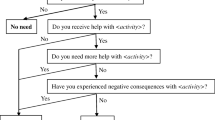Abstract
Brazil's population is aging very rapidly, and the care for the elderly is an emerging priority. The results of a multidimensional functional assessment of elderly residents in Sao Paulo showed extreme poverty and massive cohabitation in multigenerational households. The health profile showed a high prevalence of chronic illnesses, mental disorders, and disability. Using a Guttman scale, a set of activities of daily living was validated as an indicator of dependency. Attention was given to the dependency associated factors, and in particular to the association between chronic illness and loss of independence among the aged. Fortunately, for the existing health care system in Brazil, cultural values are still keeping the family in the front line of caregiving, but this situation is not likely to withstand the increasing burden of a growing elderly population with an ever higher rate of disability.
Similar content being viewed by others
References
Blay, S., L. R. Ramos, and J. J. Mari 1988 Validity of a Brazilian Version of the Older American Resources and Services (OARS) Mental Health Screening Questionnaire. Journal of the American Geriatric Society 36:687–692.
Duke University Center for the Study of Aging and Human Development 1978 Multidimensional Functional Assessment: The OARS Methodology. Durham, N.C.: Duke University.
Fillenbaum, G.G. 1985 Screening the Elderly: A Brief Instrumental ADL Measure. Journal of the American Geriatric Society 33:698–706.
Fillenbaum, G.G. 1990 Assessment of Health and Functional Status; An International Comparison. In: Improving the Health of Older People: A World View. R. L. Kane, J. Grimley-Evans, and D. Macfadyen, eds. Pp. 69–90. Oxford: Oxford University Press.
Grimley-Evans, J. 1982 Prevention of Age Associated Loss of Autonomy: Epidemiological Approaches. Journal of Chronic Diseases 37(5):353–363.
Guttman, A. 1950 The Basis of Scalogram Analysis. In: Measurement and Prediction. S.A. Stouffer, ed. Princeton University Press, New York.
IBGE-Fundacao Instituto Brasileiro de Geografia e Estatistica 1993 Anuario Estatistico do Brasil: 1992. Rio de Janeiro. IBGE
IBGE-Fundacao Instituto Brasileiro de Geografia e Estatistica 1980 Censo Demografico de Sao Paulo. Recenseamento Geral do Brasil IX Tomo I No. 19, Rio de Janeriro.
Kalache, A. R., Veras, and L.R. Ramos 1987 Ageing of the World Population: A New Challenge. Revista de Saude Publica 21(3):200–210.
Kane, R.A., and R.L. Kane 1981 Assessing the Elderly: A Practical Guide to Measurement. Toronto: Lexington Books.
Katz, S. 1983 Assessing Self-Maintenance: Activities of Daily Living, Mobility, and Instrumental Activities of Daily Living. Journal of the American Geriatric Society 31:721–727.
Katz, S., A.B. Ford, R.W. Moskowitz, B.A. Jackson, M.W. Jaffe 1963 Studies of Illness in the Aged—the Index of ADL: A Standardized Measure of Biological and Psychosocial Function, Journal of the American Medical Association 185(12):914–919.
Lawton, M.P., and E.M. Brody 1969 Assessment of Older People: Self-Maintaining and Instrumental Activities of Daily Living. The Gerontologist 9:179–186.
Ramos, L.R. (1987) Growing Old in Sao Paulo, Brazil: Assessment of Health Status and Family Support of the Elderly of Different Socioeconomic Strata Living in the Community. Ph.D. Thesis, University of London.
Ramos, L.R. 1992 Family Support for the Elderly in Sao Paulo, Brazil. In Family Support for the Elderly: The International Experience. H. Kendig, A. Hashimoto, and L. Coppard, eds. Pp. 224–232. Oxford Oxford University Press.
Ramos, L.R. 1993 Brazil. In Developments and Research on Aging: An International Handbook. E. Palmore, ed. Pp. 25–40. Westport: Greenwood Publishing Group.
Ramos, L.R., R. Veras, and A. Kalache 1987 Populational Ageing: A Brazilian Reality. Revista de Saude Publica 21(3):211–224.
Ramos, L.R., and S. Goihman 1989 Geographic Stratification by Socioeconomic Status: Methodology from a Household Survey with Elderly People in Sao Paulo, Brazil. Revista de Saude Publica 23(6):478–492.
Ramos, L.R., T.E.C. Rosa, Z.M. Oliveira, M.C.G. Medina, F.R.G. Santos 1993 Multidimensional Profile of the Resident Elderly in the District of Sao Paulo: Results from a Household Survey and Its Implications for Health Planning. Revista de Saude Publica 27(2):87–94.
Williams, R.G.A. 1979 Theories and Measurement of Disability. Journal of Epidemiological Community Health 33:32–47.
World Health Organization 1984 The Uses of Epidemiology in the Study of the Elderly. Technical Report Series 706, WHO, Geneva.
Author information
Authors and Affiliations
Rights and permissions
About this article
Cite this article
Ramos, L.R., Perracini, M., Rosa, T.E. et al. Significance and management of disability among urban elderly residents in Brazil. J Cross-Cultural Gerontol 8, 313–323 (1993). https://doi.org/10.1007/BF00972560
Issue Date:
DOI: https://doi.org/10.1007/BF00972560




